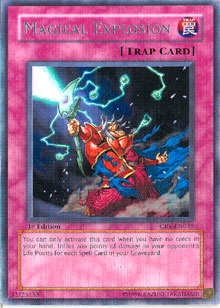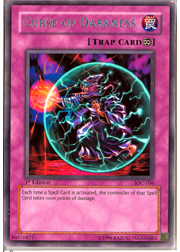 Sitting across the table from opponents who draw half their deck and set up six different potentially deadly combos while you’re helpless to stop it is awfully frustrating. It’s so frustrating, in fact, that it actually seems to be driving a number of people to play similar decks because they "win more" or are the "actual best deck of the format." Personally, I think that the people who still place decks like Magical Explosion OTK and Exodia Now! on the highest pedestal are only fooling themselves. My local metagame has been hit hard as of late by combo decks, specifically Exodia Now!, and people seem to be at a loss of what to do about it. Personally, I don't like seeing these kinds of decks on the local level because it’s impossible to make friends when you don’t actually play a game with anyone. You’ll be a lot more popular, however, if you can successfully drive the guy who compulsively plays combo decks out of his mind as he tries to beat you without having the carte blanche that most combo decks need in order to execute their strategies.
Sitting across the table from opponents who draw half their deck and set up six different potentially deadly combos while you’re helpless to stop it is awfully frustrating. It’s so frustrating, in fact, that it actually seems to be driving a number of people to play similar decks because they "win more" or are the "actual best deck of the format." Personally, I think that the people who still place decks like Magical Explosion OTK and Exodia Now! on the highest pedestal are only fooling themselves. My local metagame has been hit hard as of late by combo decks, specifically Exodia Now!, and people seem to be at a loss of what to do about it. Personally, I don't like seeing these kinds of decks on the local level because it’s impossible to make friends when you don’t actually play a game with anyone. You’ll be a lot more popular, however, if you can successfully drive the guy who compulsively plays combo decks out of his mind as he tries to beat you without having the carte blanche that most combo decks need in order to execute their strategies.
Let’s think for a moment about the overall goal of any combo deck. All combos, by definition, have pieces, and without all of those pieces or acceptable substitutes for those pieces, you have no combo and can’t win. Therefore, the purpose of every combo deck is to acquire the pieces of its combo as quickly as it possibly can. The most successful of these decks can do so on the very first turn of the game, depriving opponents of the ability to even draw their sixth card. When something like that happens, you just aren’t going to win, but it’s not as likely an occurrence as many people think. In fact, unless the probability of disruption is very high, most combo decks won’t unleash everything until they’re confident they can win regardless of your interference. In cases like these, the combo player is likely to use his or her life points as a buffer to gain the extra time needed to guarantee the win. Life points are an awfully valuable commodity at this point considering how much damage decks like Dark Armed Return can dish out in a single turn, and deciding to sacrifice them in favor of holding all your options in hand is a huge decision for any player to make. Combo decks need as many cards as they can get their hands on in order to go off successfully, and anything you can do to make it impossible for the combo player to do the things he or she needs to do in order to win is something worth doing. Fortunately, there are cards out there that exist for punishing players who need to play most of their deck in a single turn in order to win, and this week we’ll take a look at how they can be incorporated into a cohesive strategy that works against a lot more than just combo players.
By now, the Gold Series boxes should be ready and waiting for you at your local hobby store, and that removes a major restriction on players and deckbuilders everywhere. The thing that always bothered me about Crush Card Virus as an SJC prize card was that it was difficult to justify building your deck in such a way that it wouldn’t be completely obliterated if you came up against a player wielding it. It was such an infrequent occurrence at the Regional level that when players then stepped up to the Jump level, they wouldn’t even consider what would happen if they were matched up against someone with Crush Card Virus. Now that the card is out there and available to the public in a reasonably purchasable manner, it’s time to start thinking about Crush Card Virus both in terms of building to support it and building to avoid losing to it. This deck is obviously built to support it, and it features a compatibility rate with the Virus of 80% of the monsters. Basically, if you have any monster on the field, you’ll be able to use it with Crush Card Virus, and that’s huge. Exiled Force isn’t going to stick around, ever, so when there is a monster on the field, your opponent needs to play in such a way as to minimize the impact that Virus would have on him or her should you be holding it. This may not be an effective way to deal with combo decks, but as I mentioned above, I don’t want the deck to be a one-trick pony that beats Magical Explosion and Exodia, and loses to everything else.
 The overall concept of the deck is simple. If either duelist wants to play anything, he or she is going to have to have to pay for it. In general, the going price for playing a card is 500 life points thanks to Chain Energy, but in the case of spells, that can be raised to 1500 life points if you can get Curse of Darkness onto the field as well. It won’t really affect you since you only have six spells in the deck, one of which requires that you have no spells in the graveyard in order to be operative. An important distinction to make between Chain Energy and Curse of Darkness is that Chain Energy is a cost to play cards whereas Curse of Darkness simply deals damage to anyone who does so. It’s a crucial point to consider because decks that rely on infinitely looping Dimension Fusion cards in order to win facilitate this by playing Spell Economics to mitigate the costs of spells. But Spell Economics isn’t going to block that 1000 damage every time an opponent plays Dimension Fusion when you have the Curse out, and it isn’t going to block the 1000 he or she takes for playing Spell Economics or the 1000 that duelist takes for playing any of those other draw spells that the opponent needs in order to make the combo deck work. It’s nasty and unpleasant and it also works against Dark Armed Return duelists when they try and draw half of their decks.
The overall concept of the deck is simple. If either duelist wants to play anything, he or she is going to have to have to pay for it. In general, the going price for playing a card is 500 life points thanks to Chain Energy, but in the case of spells, that can be raised to 1500 life points if you can get Curse of Darkness onto the field as well. It won’t really affect you since you only have six spells in the deck, one of which requires that you have no spells in the graveyard in order to be operative. An important distinction to make between Chain Energy and Curse of Darkness is that Chain Energy is a cost to play cards whereas Curse of Darkness simply deals damage to anyone who does so. It’s a crucial point to consider because decks that rely on infinitely looping Dimension Fusion cards in order to win facilitate this by playing Spell Economics to mitigate the costs of spells. But Spell Economics isn’t going to block that 1000 damage every time an opponent plays Dimension Fusion when you have the Curse out, and it isn’t going to block the 1000 he or she takes for playing Spell Economics or the 1000 that duelist takes for playing any of those other draw spells that the opponent needs in order to make the combo deck work. It’s nasty and unpleasant and it also works against Dark Armed Return duelists when they try and draw half of their decks.
Basically what you do with this deck is wait for your opponent to slowly chip away at him or herself by trying to set up combos and win conditions, and then deliver the finishing blows yourself by means of burn traps and Stealth Bird. Chain Energy remains one of the most infuriating cards to play against, and in conjunction with D.D. Borderline it creates a system of taxation without representation that doesn’t give your opponent’s monsters any say in the matter regardless of whether you play any yourself. Your traps are there to get in the extra damage you’ll need to finish off a weakened opponent or shut down key moves that might otherwise allow him or her to break through to you. The best part about it is that once everything is set up, you don’t really need to play many cards to keep it in place since your opponent is going to try to play as few cards as possible until he or she finds Heavy Storm. Obviously, you’d want to negate the Storm if you can, but that’s not always possible thanks to our android enemy, Jinzo. If Jinzo hits the table, you’re likely going to take a pretty big beating. Fortunately, the easiest way to keep him away is to keep him from ever being summoned. You can accomplish this with Solemn Judgment, but it’s easier to not let it come to that and tackle the problem at the source: the monsters your opponent wants to tribute for Jinzo. This is what Exiled Force and Swarm of Scarabs are for. If you can keep Jinzo from hitting via tribute summon, your opponent is forced to get him into play some other way . . . most likely by means of a spell or trap card. Setting that up takes more cards from your opponent, which in turn means more free damage and an increased potential for a game-ending Secret Barrel.
At higher levels of competition, this deck is likely to be a lot harder to get away with since Dust Tornado and decks that can run it are getting more and more popular, but I’m fairly certain that you could take this into a local event and get away with setting up your locks all day long. Just try not to overplay decks like this, since they create another kind of not-fun-for-other people situation. It’s not the same level of annoying as not getting to play at all, but it’s still a constricting playstyle that’s liable to make a few people upset. Except, of course, when you use it against someone who keeps drawing all of Exodia in two turns.
Until next time, play hard, play fair, and most importantly, have fun!
Jerome McHale
jcmchale@andrew.cmu.edu